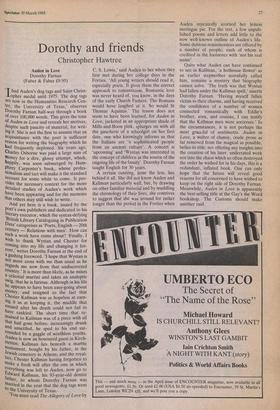Dorothy and friends
Christopher Hawtree
had Auden's dog tags and Saint Christ- opher medal until 1975. The dog tags are now in the Humanities Research Cen- ter, the University of Texas,' observes Dorothy Farnan half-way through a book of over 100,000 words. This gives the tone Of Auden in Love and reveals her motives, despite such paucity of material, for writ- ing it. She is not the first to assume that an acquaintance with the poet is sufficient reason for writing the biography which he had frequently deplored. Six years ago, Charles Osborne was paid a large sum of money for a dire, glossy attempt, which, happily, was soon submerged by Hum- phrey Carpenter's book, whose profes- sionalism and tact will make it the standard account for some while to come. It pro- vides the necessary context for the more detailed studies of Auden's work which have been appearing and for the memoirs that others may still wish to write. And yet here is a book, issued by the Poet's own publishers and dedicated to his literary executor, which the syntax-defying. 'British Library Cataloguing in Publication Data' categorises as 'Poets, English — 20th century — Relations with men'. How can such a work have come about? 'Finally, I wish to thank Wystan. and Chester for Coming into my life and changing it for- ever,' writes Dorothy Farnan at the end of a gushing foreword. 'I hope that Wystan is not more cross with me than usual as he regards me now from that undiscovered country. It is more than likely, as he mixes a celestial martini and takes an analeptic !wig, that he is furious. Although in his life Ile appears to have been easy-going about money, and resigned to the fact that Chester Kallman was as hopeless at earn- ing it as at keeping it, the muddle that ensued after his death could not fail to have rankled. The short time that re- mained to Kallman was of a piece with all that had gone before: increasingly drunk and unsettled, he sped to his end sur- rounded by a gaggle of worthless youths. Auden is now an honoured guest in Kirch- stetten; Kallman lies beneath a marble monument, bought by his father, in the Jewish cemetery in Athens; and the royal- ties, Chester Kallman having forgotten to Make a fresh will after the one in which everything was left to Auden, now go to Edward Kallman, his 93-year-old dentist father, to whom Dorothy Farnan was married in the year that the dog tags went to the University of Texas. YOU must read The Allegory of Love by C. S. Lewis,' said Auden to her when they first met during her college days in the Forties. 'All young writers should read it, especially poets. It gives them the correct approach to romanticism. Romantic love was never heard of, you know, in the days of the early Church Fathers. The Romans would have laughed at it. So would St Thomas Aquinas.' The lesson does not seem to have been learned, for Auden in Love, jacketed in an appropriate shade of Mills-and-Boon pink, splurges on with all the gaucherie of a schoolgirl on her first date, one who knowingly informs us that the Italians are 'a sophisticated people from an ancient culture'. A concert is 'upcoming' and Wystan was interested in the concept of children as the source of the ongoing life of the family'. Dorothy Farnan taught English for 30 years.
A certain cunning, none the less, lies behind it all. She did not know Auden and Kallman particularly well, but, by drawing on other familiar material and by muddling the chronology of their lives, she contrives to suggest that she was around for rather longer than the period in the Forties when Auden repeatedly scorned her lemon meringue pie. For the rest, a few unpub- lished poems and letters add little to the now well-known outline of Auden's -life. Some dubious reminiscences are offered by a number of people, each of whom is credited in the footnotes with 'not his real name'.
Quite what Auden can have continued to see in Kallman, 'a hothouse flower' as an earlier stepmother scornfully called him, remains a mystery that biography cannot solve. 'The truth was that Wystan had fallen under the Kallman spell,' asserts Dorothy Farnan. 'Having myself fallen victim to their charms, and having received the confidence of a number of women connected romantically with Eddie's brother, sons, and cousins, I can testify that the Kallman men were sorcerers.' In the circumstances, it is not perhaps the most gract ful of sentiments. Auden in Love, a welter of clumsy, crude prose as far removed from the magical as possible, belies its title: not offering any insights into the creation of his later, underrated work nor into the chaos which so often destroyed the order he wished for in his days, this is a redundant, inflated book. One can only hope that the future will reveal good reasons for all concerned to have wished to keep on the right side of Dorothy Farnan. Meanwhile, Auden in Love is apparently the best-selling title at the Gay's the Word bookshop. The Customs should make another raid.














































 Previous page
Previous page